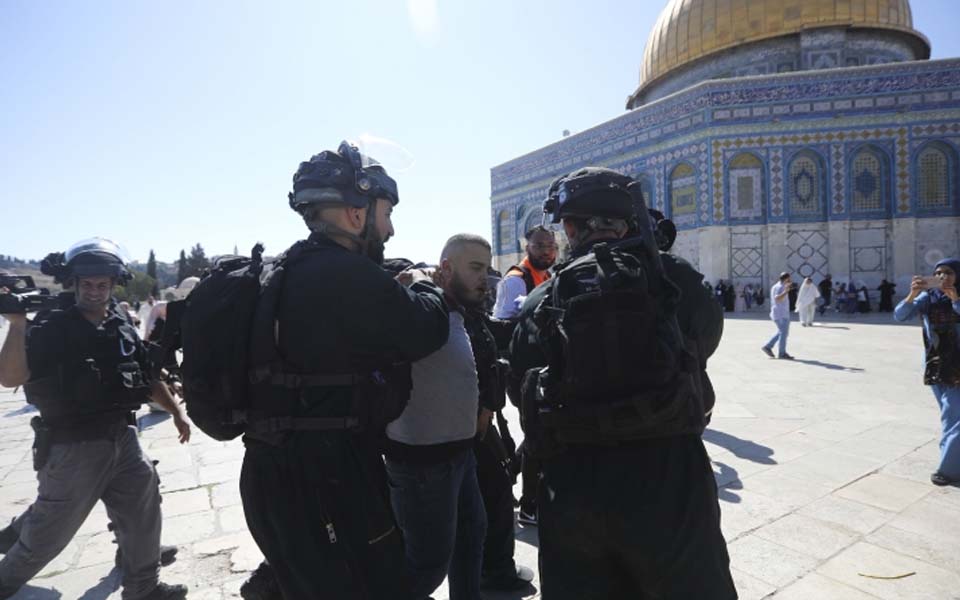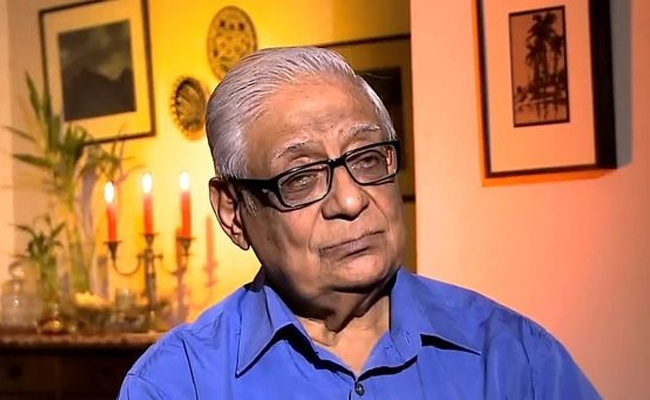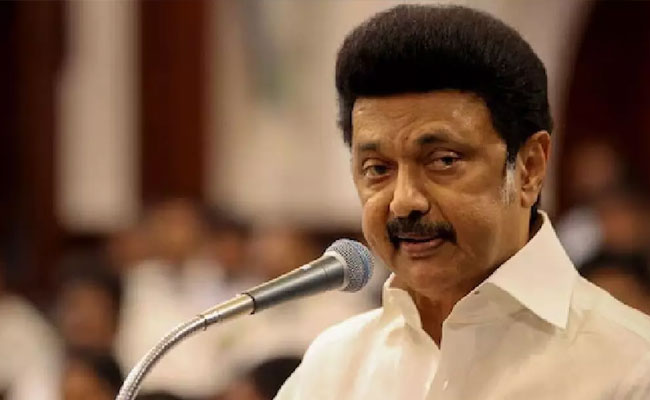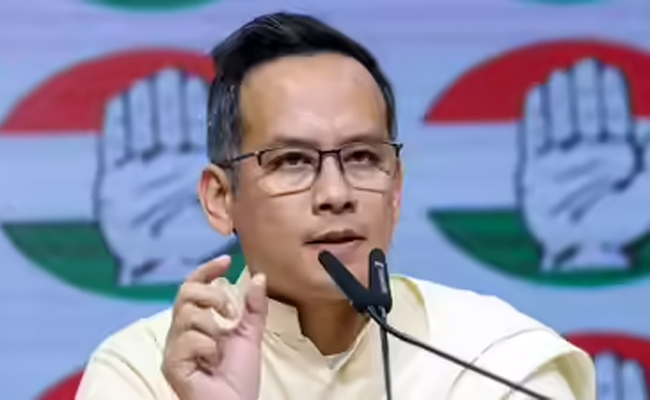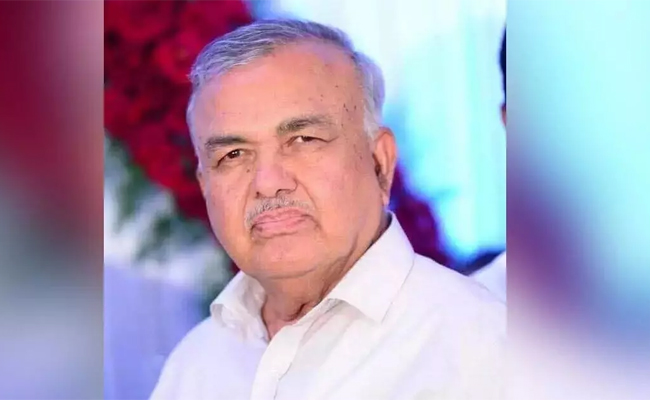Jerusalem, Aug 11: Muslim worshippers and Israeli police clashed Sunday at a major Jerusalem holy site during prayers marking the Islamic holiday of Eid al-Adha.
Palestinian medics said at least 14 people were wounded, one seriously, in the skirmishes with police at the site, which Muslims refer to as the Al-Aqsa mosque compound and Jews refer to as the Temple Mount.
Police said at least four officers were wounded. Witnesses said at least two people were arrested.
Clouds of tear gas swirled and stun grenades thundered across the stone-paved esplanade as masses of worshippers skirmished with police in the worst bout of fighting at the contested holy site in months.
The clashes came amid heightened tensions between Israel and the Palestinians, just days after an Israeli soldier was killed south of Jerusalem.
On Saturday, Israeli troops killed four Palestinian militants who attempted to cross the Gaza border fence.
Tens of thousands of Muslims had flocked to the site in Jerusalem's Old City early Sunday for holiday prayers, police said.
Jews are also observing on Sunday the Ninth of Av, a day of fasting and mourning for the destruction of the two Biblical temples which stood at the site in antiquity.
The site is the holiest for Jews and the third holiest for Muslims, after Mecca and Medina in Saudi Arabia, and has long been a flashpoint at the epicenter of the Israeli-Palestinian conflict.
Jordan, which serves as the custodian of the holy site, said in a statement that it had sent a formal complaint to Israel and condemned what it called Israel's "irresponsible provocations."
Sufian al-Qudah, a spokesman for the Jordanian Foreign Ministry, said Amman holds Israel completely responsible for the violence.
Large numbers of Palestinians had gathered at the gates of the compound early Sunday after rumors circulated that police would allow Jewish visitors to enter the site.
The protesters chanted "Allahu Akbar" (God is greatest) and threw stones at police, who then charged into the compound while firing stun grenades and rubber-coated bullets.
Israeli police had initially barred entry to Jewish visitors, but reversed their decision after the clashes broke out and allowed them to enter.
Several dozen entered the site under close police escort and Muslim worshippers began throwing chairs and other objects at the group.
The Jewish visitors left the compound shortly thereafter.
Jerusalem District police commander Doron Yedid told Israeli media that the decision to allow Jewish visitors to enter the site was made "with the backing of the top political officials."
Police spokesman could not be reached for comment.
The reversal came after Israeli Prime Minister Benjamin Netanyahu's religious nationalist allies called for the site to be opened to Jewish visitors.
Israelis are headed to unprecedented repeat elections next month after Netanyahu failed to form a government following April's elections.
Jews are barred from praying at the compound under a longstanding arrangement between Israel and Muslim authorities.
Jewish tradition also maintains that Jews should avoid entering the holy site.
But in recent years Israeli religious nationalists have stepped up visits to the site to challenge the arrangement.
Jewish extremists have called for destroying the mosque and rebuilding the Biblical temple.
The Palestinians view such visits as provocations, and have long feared that Israel intends to take over the site or partition it.
The Israeli government has repeatedly said it has no intention of changing the status quo.
Hanan Ashrawi, a senior leader in the Palestine Liberation Organization, said Israel was "fueling religious tensions in Jerusalem," adding that Israeli officials are "fully responsible for its grave consequences."
The compound is in east Jerusalem, which Israel captured in the 1967 war along with the West Bank and the Gaza Strip, territories the Palestinians seek as part of a future state.
Israel views all of Jerusalem as its unified capital, while the Palestinians want east Jerusalem as the capital of their future state.
Israeli-Palestinian tensions have spiked following President Donald Trump's decision in 2017 to recognise Jerusalem as Israel's capital and move the US Embassy there.
The Israeli-Palestinian peace process has been moribund for at least a decade, and the Palestinians have cut ties with the Trump administration over what they see as its unfair bias toward Israel.
In a separate incident on Sunday, Israeli troops killed a Palestinian gunman after he opened fire on them from across the perimeter fence around the Gaza Strip.
The Israeli military said an "armed terrorist" approached the frontier early Sunday and opened fire toward troops on the other side, who responded by shooting at the attacker.
The army said a tank also targeted a nearby military post operated by the Islamic militant group Hamas.
The Palestinian Health Ministry in Gaza identified the deceased as 26-year-old Marwan Nasser.
It was not clear if he was a member of an armed group, and no one immediately claimed responsibility for the attack.
On Saturday, Israeli troops killed four Palestinian militants who the army said had tried to carry out a cross-border attack.
Hamas, which has ruled Gaza since 2007, said the attack was an "individual act" carried out by youths frustrated at the Israeli-Egyptian blockade on Gaza and was not planned by the group.
Let the Truth be known. If you read VB and like VB, please be a VB Supporter and Help us deliver the Truth to one and all.
New Delhi (PTI): HK Dua, a distinguished journalist and a veteran of Indian public life who held the rare distinction of helming editorial operations at three of India's leading newspapers, passed away on Wednesday at the age of 88.
He breathed his last peacefully this afternoon at a private hospital, a member of his family said.
His cremation will take place at Lodhi Road crematorium on Thursday.
Dua was admitted to the hospital around three weeks ago. He was survived by wife Adity and son Prashant.
In a remarkable career spanning over four decades, Dua traversed the world of journalism, served as a media advisor to two prime ministers -- Atal Behari Vajpayee and HD Deve Gowda -- and transitioned into the roles of a diplomat and parliamentarian.
A Padma Bhushan recipient, Dua was known for his affable persona, sharp political insight and unwavering commitment to editorial independence. He commanded respect across the political spectrum.
Dua served as editor of The Hindustan Times (1987-94), Editor-in-Chief of The Indian Express (1994-96) and The Tribune (2003-09) and Editorial Advisor for The Times of India (1997-98).
Born on July 1, 1937, Dua also served as India's ambassador to Denmark (2001-2003).
He was a nominated member of Rajya Sabha (2009-2015), where he contributed significantly to debates on foreign affairs and national security. He was also part of several high-profile parliamentary committees, including the Standing Committee on Foreign Affairs and the Consultative Committee for the Ministry of Home Affairs.
A two-term president of the Editors' Guild of India and a steadfast defender of democratic values, Dua also served on the National Security Advisory Board and received honorary doctorates from Punjab and Kurukshetra Universities for his contributions to the Fourth Estate.
Apart from the Padma Bhushan, he received several awards, including the Durga Ratan award and the Bal Gangadhar Tilak award for excellence in journalism.
Leaders across the political spectrum and members of the media fraternity expressed condolences over Dua's demise.
"My deepest condolences on the passing of H K Dua, a distinguished journalist, diplomat, and Padma Bhushan recipient whose commitment to truth, editorial independence, and public service enriched public discourse," Congress president Mallikarjun Kharge said on social media.
Shiromani Akali Dal President Sukhbir Singh Badal said Dua upheld editorial independence with unwavering integrity, sharp insight, and commitment to democratic values.
"His contributions as a journalist and an editor across leading newspapers leave behind an enduring legacy," he said.
Congress MP Shashi Tharoor said: "A journalistic giant has left us."

